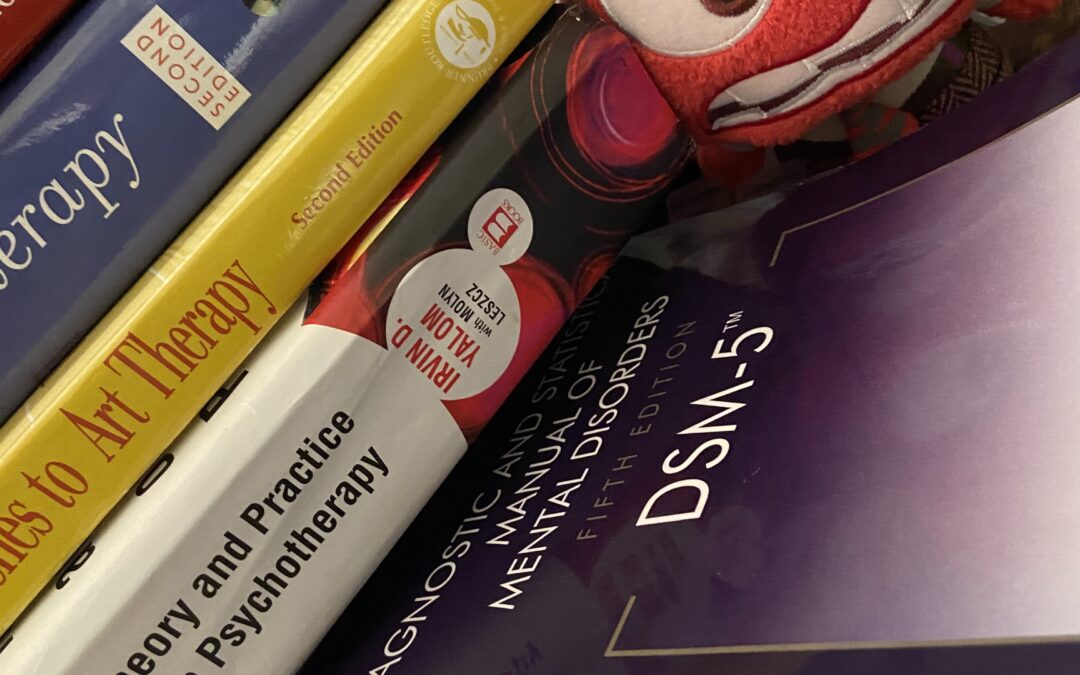Are you a grad student in a counseling, therapy, social work, or art therapy program? I highly recommend art therapy for therapy students while they are in their programs.
Transcription follows below:
Hi, my name is Maggi Colwell and I’m a board-certified, registered art therapist living in Columbus, Ohio.
I recently talked to a couple of students in the past month through Zoom for projects they were doing for school. One of them is a bachelor’s level student interested in art, art therapy, and psychology and the other is a graduate-level student working on an art therapy degree. They posed questions for those of us who are working in the field.
I recommend Art Therapy for Therapy Students
I enjoyed these chats and felt inspired, so I felt like I had to share this with you for a post is that my main recommendation for students in counseling, social work, psychology, or art therapy is seeing a therapist personally while you are in graduate school.
Godsend for When I was in Grad School
Luckily, I attended personal counseling and art therapy before I got into school, and then I started Jungian analysis about 6 months before I started my program and it was a Godsend. Honestly, I don’t think I would have gotten through my art therapy graduate program if it been for my analyst helping me and supporting me along the way. They give you extra support and are a mentor.
And here’s the other bit of it; graduate school is, hard.
The schedule is crazy; you have a whole lot to do. You don’t have enough time to be working, so you don’t have money, you don’t have enough time. Basically, you’re exhausted, and on top of it, counseling and art therapy programs are transformative. The assignments build one on top of another and it changes for you are as a person. A lot of the assignments question weak spots and wounds you have.
Know Thyself, or Call it Fate
If you’re not dealing with your past trauma or even personality clashes, you’re going to project it into your world and make your life that much more chaotic. Projection by its nature means that you aren’t consciously aware that you are doing it. Your complaints about the program, your professors, your classmates, and your clients are all things to be looking at as aspects of your internal world.
Personal Therapy is an Investment in Yourself
You really do need to be hashing out on our own time in personal counseling. Your teachers, while they are licensed counselors, they don’t have time to work on these issues with you, and more importantly, it’s not their role. They are your teacher, not your therapist. So I would recommend considering counseling or art therapy as part of your schooling expenses. It is a worthwhile investment that will help you be a better therapist in the long run too.
Group Supervision isn’t Enough
In the United States, therapy for aspiring therapists is not always required. It is usually highly recommended. But, honestly, I don’t know how you get through a therapy program without it. Once you get into practicums and your internships, you are working with clients and you’re learning on the fly, so a lot of don’t know what you’re doing yet. You’re making mistakes the mistakes and the stakes are high because you’re trying to avoid hurting people or making their problems worse.
You’ll be in a group supervision class as part of your practicum experience. However, that’s with a bunch of other students, and they are using that class as a way to integrate theory that you’ve learned into practice. Furthermore, you’re also dealing with the ins and outs of how to run a therapy session and if you are doing it write. In the case of art therapy, you are also experimenting with your style to see what works for you as an art therapist.
So the problem with that is because it’s group supervision, there’s very little time to deal with countertransference in that finite amount of time.
On Countertransference
Countertransference in a therapy session is what comes up for the therapist in a session that is triggered by the client’s content.
That could you see your client through the lens of past experiences that you’ve had, relationship issues with other people. Clients can trigger your complexes and you’re acting out of an unconscious, habitual way of acting, or projecting on your client something that they aren’t actually doing, but it is what you’re perceiving because of your unprocessed, unconscious issues. The first couple of paragraphs of the wikipedia article on countertransference quotes both Freud and Jung about the unconscious pitfalls and challenges of countertransference and how necessary it is to address.
If you aren’t in therapy that is working with you on countertransference, you aren’t going to see your blind spots. That’s why they are blind spots; you aren’t aware of them! That seems obvious, right?
Therapy and Stigma
And yet, many people who become therapists haven’t done therapy. Part of this issue, I think, is the stigma of therapy itself, which seems somewhat counterintuitive for somebody in a counseling program. But its also, because there is the stigma of thinking that someone who goes to therapy is ill that someone who gets mental health treatment is somehow not a healthy person.
Therapy as a Strength-Based Approach
Honestly, I think everybody should try some therapy. It can be from a strength-based approach! Just because you’re getting by okay and may not have any mental health diagnoses, doesn’t mean that therapy wouldn’t help you or make you a better person. It can help you be more aware of bad habits, and your blind spots. It can be about wellness, self-discovery, and optimizing your life.
It can also make you better at social interactions and enhance your relationships. There are all sorts of things that might be good enough, but could definitely be better. So that’s part of it too.
Art Therapy for Therapy Students
All of that said, I really like working with students. That’s why I offer a special student rate, if you’re currently in an art therapy or counseling program and would like to do some art therapy for yourself. Therapy can cost about as much as a car payment.
The Priceless Investment in Yourself
When you’re paying for it out of pocket, you don’t have to worry about if your insurance is going to cover the type of therapy or if it is in-network. You don’t have to worry about winding up with a diagnosis you don’t need when you are doing coaching or therapy for self-improvement. If you consider it part of your schooling expenses, therapy is an investment in yourself.
Get in Touch
So if you’re a student, contact me and ask me about my student rates. I’m happy to talk to you more about how I work and answer any questions you may have. You can book a free consultation session with me directly through my website here.

